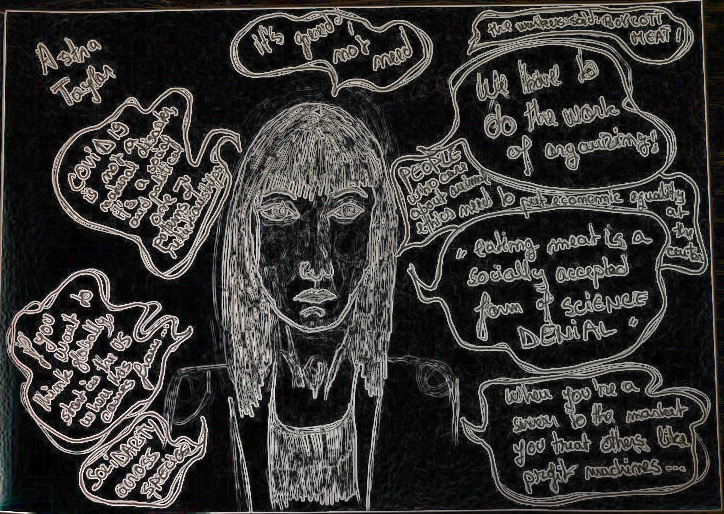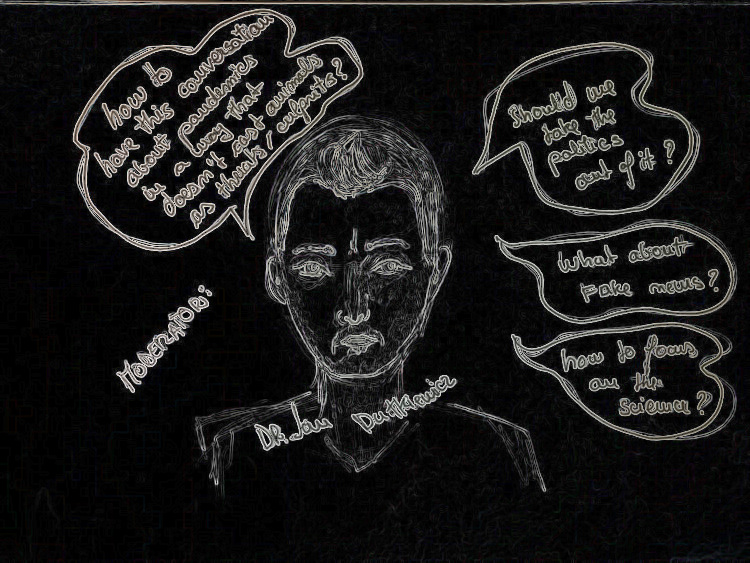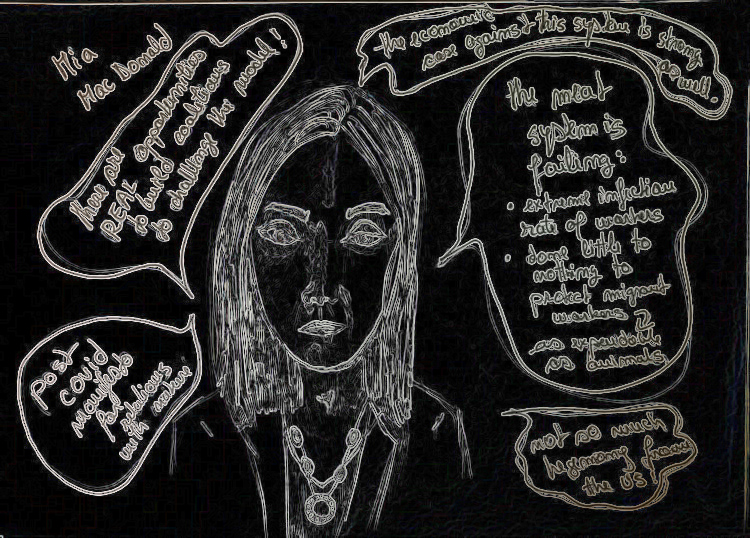Animals, Pandemics and Global Health

Date: Friday, September 18, 2020
In the first session, we will explore how human use of wild and domestic animals for food, together with environmental destruction and habitat loss, leads to an increase in zoonotic diseases with high potential to turn into epi- and pandemics. We will discuss the consequences for global human and animal health and wellbeing, including: What role does industrial animal agriculture play? How can we prevent the future development of zoonoses that may turn into epi- and pandemics?
First, we will look at the history of zoonoses: What is the common thread for the development and spread of zoonotic infectious diseases? Second, we will analyze why our current interaction with other animals is detrimental for our health: Why is industrial animal agriculture a breeding ground for new zoonotic diseases? What are the eclectic consequences of eating animals? Is the better treatment of animals critical for maintaining human health and preventing future pandemics? Third, we will deliberate why our global food system must be radically transformed in order to protect both humans and non-human animals: Which steps need to be taken to achieve a speedy transition away from animal agriculture towards plant-based agriculture?
Moderator: Jan Dutkiewicz (Harvard Law School)
Speakers: Michael Greger (NutritionFacts.org), Mia MacDonald (Brighter Green), Astra Taylor (Documentary filmmaker and writer)
Abstracts
Michael Greger
There is a single species responsible for the COVID-19 pandemic: humans. Over the last few decades, hundreds of human pathogens have emerged at a rate unprecedented in human history. Emerged from where? Mostly from animals. The AIDS virus is blamed on the butchering of primates in the bushmeat trade in Africa, we created mad cow disease when we turned cows into carnivores and cannibals, and SARS and COVID-19 have been traced back to the exotic wild animal trade. Our last pandemic, swine flu in 2009, arose not from some backwater wet market in Asia, however. It was largely made-in-the-USA on pig production operations in the United States. In this new age of emerging diseases, there are now billions of feathered and curly-tailed test-tubes overcrowded and intensively confined in filthy factory farms for viruses to incubate and mutate within. Today’s animal agricultural practices have given viruses billions more spins at pandemic roulette. How can we stop the emergence of pandemic viruses in the first place? Whenever possible, treat the cause. Discontinuing the intensive confinement of animals in factory farm operations and accelerating the movement to plant-based meat, eggs, and milks are long-overdue steps to shoring up the levees and staving off the next deadly pandemic.
Mia MacDonald
Industrialized animal agriculture has shown itself both rigid, flawed, and profoundly vulnerable—not least because it demands that humans and animals conform to a mechanized, just-in-time, production-line model that neither serves the welfare of workers nor animals, nor (in a time of emergency) the needs of people for food. COVID-19’s disruption of the institutional supply chain for animal products and other foods has led in the U.S. to the forced “depopulation” of millions of piglets, chicks, and calves, and vast amounts of milk, meat, and vegetables being thrown away.
Animal agriculture makes bad problems worse, and is premised on set of interrelated profoundly inequitable relationships. It is a substantial contributor to greenhouse gas emissions, driving biodiversity loss and land use-change, wasting potable water—and despoiling surrounding environments for the people who live there, who are all too often lower-income or communities of color. It is these communities who are also disproportionately affected by the climate crisis, in both the global South and the global North.
It is an irony that the COVID-19 outbreak and subsequent lockdown revealed to many the possibility of a world with cleaner skies, more birdsong, the return of wild animals, and a greater awareness of our local environments overall. Post-COVID, a different reality for ourselves and the non-human world is not only desirable but essential. This world is ultimately one that also promises, and delivers, a new relationship with the natural world: of replenishment as opposed to extraction, and of justice that ensures the survival of billions of species, including our own, and the planetary systems upon which all lives depend.
Brighter Green welcomes input on two documents of principles we’re working to develop. Each is informed by the consequences of the COVID pandemic for the human and non-human worlds. For more details click here.
Astra Taylor
Astra Taylor will talk about the importance of looking at the political economy of the global food system, which must be radically transformed in order to protect both humans and non-human animals. The talk will address the fact that while there is a growing progressive movement in the United States that takes seriously issues of corporate concentration of power, economic inequality, environmental destruction, and public health, a deeper discussion about the exploitation on non-human animals is usually avoided – but urgently necessary.
Resources
FERN data tracker on COVID infections in food chain workers in the U.S., including meat processing. Food & Environment Reporting Network, 2020
IPCC land report, summary for policymakers. Intergovernmental Panel on Climate Change, August 2019
Press release for IPCC land report. Intergovernmental Panel on Climate Change, 2019
Global biodiversity outlook summary for policymakers. Convention on Biological Diversity, September 2020
Hayek, M.N., Harwatt, H., Ripple, W.J., and Mueller, N.D. 2020. The carbon opportunity cost of animal-sourced food production on land. Nature Sustainability
Brighter Green statement for World Environment Day: June 5, 2020
MacDonald, M., and Molidor, J. Gassed, Shot and Suffocated. Op-ed on COVD and “depopulation” of farmed animals in U.S. June 29, 2020
Beyond the Impossible: the Futures of Plant-based and Cellular Meat and Dairy, July 2019
The Covid-19 pandemic shows we must transform the global food system. Dutkiewicz, J., Taylor, A., and Vettese, T. oped on The Covid-19 pandemic shows we must transform the global food system. The Guardian, April 16, 2020
Taylor, A., and Taylor, S. Solidarity Across Species. Dissent, Summer 2020
Dutkiewicz, J. The Climate Activists Who Dismiss Meat Consumption Are Wrong. New Republic, August 31, 2020
Kristiansen, S., Painter, J. and Shea, M., 2020. Animal Agriculture and Climate Change in the US and UK Elite Media: Volume, Responsibilities, Causes and Solutions. Environmental Communication, pp.1-20
Mostafa, A., Abdelwhab, E.M., Mettenleiter, T.C. and Pleschka, S., 2018. Zoonotic potential of influenza A viruses: a comprehensive overview. Viruses, 10(9), p.497
Greger, M. The COVID-19 Pandemic May Just Be a Dress Rehearsal. NutritionFacts, July 22, 2020
Greger, M. How to Prevent the Next Pandemic. NutritionFacts, July 27, 2020
Jones, B.A., Grace, D., Kock, R., Alonso, S., Rushton, J., Said, M.Y., McKeever, D., Mutua, F., Young, J., McDermott, J. and Pfeiffer, D.U., 2013. Zoonosis emergence linked to agricultural intensification and environmental change. Proceedings of the National Academy of Sciences, 110(21), pp.8399-8404
Schuck Paim, C. and Alonso, W.J. Ebook: Pandemics, Global Health and Consumer Choices. 2020
Thanks to Maria Martelli for the drawings (Twitter: @Mistheother)



